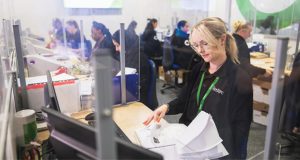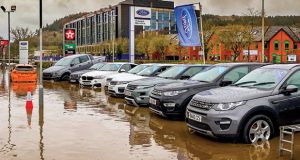The CoreNet Global Summit in Orange County, California, USA, questioned the role of corporate real estate in leading, creating and fostering experiences that enable business success. Jo Sutherland Magenta Associates MD and IFMA UK chapter Board Director reports
“We’ll keep moving forward, opening new doors, and doing new things, because we’re curious and curiosity keeps leading us down new paths.” Walt Disney.
Touching down in Orange County, California – the home of Disneyland – must have prompted a wry smile from the 2,000 suited and booted corporate real estate professionals that had travelled among excited families dressed in matching Frozen t-shirts and Mickey Mouse ears.
As locations go, it felt odd to meander the sidewalks that literally lead to dreams, only to take a left at Convention Way. Unbeknown to those attending the North American CoreNet Global Summit in Anaheim, however, they were in for a bit of magic and sparkle of their own…
In his inspiring, hilarious and downright awesome keynote, Duncan Wardle, creativity consultant and former head of innovation and creativity at Disney, encouraged the delegates to unleash their inner-child.
“The biggest barriers to innovation are ourselves and the rivers of thinking we get trapped in,” he said. Wardle challenged the audience to ask ‘why?’ more, think ‘what if?’ more, be more curious, brave and, perhaps most importantly, to take some timeout to think, to play and to remember what it feels like to be creative.
“We’ve all got it in us,” he said, following an exercise that involved thousands of CRE leaders pretending to be sex therapists for honey bees.
In the networking break, the whispers about how Wardle’s talk prompted people to think differently about work, play and purpose were louder than the air con that was cranked up to a “Do you want to build a snowman?” level.
Good ideas can come from surprising places. That was a theme that united speakers at the Californian conference. Take JLL’s David Barnet’s session. Barnet offered delegates a crash course in engagement through experience by turning to the craft beer industry for inspiration. Having undergone explosive growth, the craft beer industry is a great example of experiential retail. This parallel sector is at war for consumers, while corporate occupiers are in the battleground for talent. Outside of hops and barley, the ingredients for a perfect brew (experience-wise) are fivefold: immersive, meaningful, human, access, intuitive, personalised.
This potion of sorts can be applied to real estate strategies in order to boost engagement. Provide options for peace and quiet, and for community connections. Make people feel happy in their environment. And make them feel good about the company they work for.
Having worked in both breweries and CRE teams, Barnet stressed the importance of embracing values and showcasing what the organisation stands for. “Make people feel part of something because human experience trumps the charts when it comes to the potential value add of corporate real estate,” he said.
This was a tune shared by Leesman. Peggie Rothe and Racha Kamal’s session on the employee workplace experience emphasised the idea that, like the kids high on sugar in Disney Downtown, experience is a perception of reality at that point in time. Rothe and Kamal stressed that it is the sentiment that counts because perception is the thing that dictates whether an experience is good or bad.
Real estate leaders now have within their reach the means to transform both their profession and the organisations they represent. But this unprecedented opportunity demands a bold change to the way the industry measures success. The Leesman duo suggested that the answer lies in a powerful new KPI: the employee experience. By switching focus and adjusting the measure, real estate leaders could reclaim lost value and reinvigorate workplaces as catalysts for competitive advantage.
“Don’t dial down cost, dial up experience,” said Rothe, “because that’s the way to maximise CRE assets, employee engagement and organisational performance.”
The CoreNet line-up in the land of Disney would not be complete without a magic show. The magic in question involved unravelling the mystery of how CRE can leverage tech not just to improve efficiency but also completely change the way the industry operates.
Before walking the audience through an AI demonstration, CBRE Host offered some much-needed context for AI’s role in the workplace. “Think of AI as your mum,” said Brennan McReynolds of CBRE 360. “She listens to you, she has your best interests at heart, she knows what you need before you do, and she makes your favourite foods.”
Like our nearest and dearest, AI will get to know us and our preferences. In the workplace, it will make spaces emotionally intelligent. It will earn our trust. And it will improve efficiency by reducing the number of touchpoints to get you what you need, or to get you from A to B.
 But it gets better than that. In fact, the products CBRE Host is piloting promise to knock your business socks off. Delegates watched an ‘as live’ demonstration of an engineer based in one country helping an end user based in another country. And here’s the rub, the headsets that create an augmented reality mean that this end user and the specialist engineer could walk into the same room and work together to resolve the problem, despite the hundreds or thousands of miles that physically separated them. Think Pokémon but with engineers instead of pikachus.
But it gets better than that. In fact, the products CBRE Host is piloting promise to knock your business socks off. Delegates watched an ‘as live’ demonstration of an engineer based in one country helping an end user based in another country. And here’s the rub, the headsets that create an augmented reality mean that this end user and the specialist engineer could walk into the same room and work together to resolve the problem, despite the hundreds or thousands of miles that physically separated them. Think Pokémon but with engineers instead of pikachus.
The shift in focus from asset performance to the human experience has changed the physical use of space. It is all about people now. And that’s why there’s a new type of Disney thinking in CRE. Because where the workplace used to be a place you had to go, now it’s a place you want to go.




